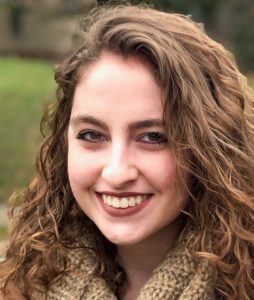Maggie Leone (COM ‘21) 
Originally from Pittsburgh, Maggie Leone is a journalism student in the BU College of Communication. Taking CAS RN 384 The Holocaust encouraged Maggie to explore the topic further and meet survivor Irene Shashar. For the past two and a half years, Maggie has been working with Irene to compile her memories of the Holocaust in order to help Irene share her history. She is honored to have gained Irene’s trust and friendship.
On January 31, 2021, the Holocaust, Genocide, and Human Rights Studies program at Boston University, AJC New England, the Consulate General of Israel to New England, and the Elie Wiesel Center for Jewish Studies presented the 2020 documentary Holy Silence, which details the abhorrent silence from the Vatican during the Holocaust. Pope Pius XI planned to denounce anti-Semitism and racism through an encyclical authored by American Jesuit John LaFarge. Unfortunately, however, he died the night before presenting the document. Eugenio Pacelli — who became Pope Pius XII in 1939 — did what he could to silence his predecessor’s remarks on antiracism and saw to it that Pius XI’s encyclical never saw the light of day.
Since watching Holy Silence and listening to the panel discussion with Fr. Charles Gallagher, an Associate Professor of History at Boston College (who appeared in the film), and Rob Leikind, the Director of AJC New England, I have been thinking primarily about one major question posed in the film: What difference could German Catholics have made if they had been actively against the Holocaust?
While it seems a logical question, it is something I have never specifically pondered before. There are many layers to it — many actions that could have been taken on behalf of aiding Jewish people and yet the question will remain unanswerable forever. With a few words or actions from the Pope, European Catholics could have been allies for Jewish victims of the Holocaust. Pope Pius XII ostensibly chose a side through his efforts to remain neutral. His silence was a loud enough proclamation that he would not stand in Hitler’s way; his failure to denounce the actions of the Nazi party did nothing to help the plight of Europe’s Jewish population.
Furthermore, to put it simply, the ideals of Nazism and Catholicism do not particularly align, so I find it interesting that so many German Catholics wanted “permission” from the Pope to follow Hitler. While I cannot understand how Nazism seemed to be the correct methodology to anyone, Catholic interest in the movement seems especially vexing. For a group of people whose belief system hinges upon acceptance, forgiveness, and treating people with empathy, I cannot comprehend the inclination to follow Hitler.
As a Catholic myself, I thought it was really important to hear from Fr. Gallagher, as he spoke passionately about Pacelli’s missteps upon his papal election. He also stated that the reaction to the film has been overwhelmingly positive since its release last year. As our society continues to bear witness to discriminatory and racist acts, perhaps we can use Pope Pius XII’s silence as an example of what not to do.
